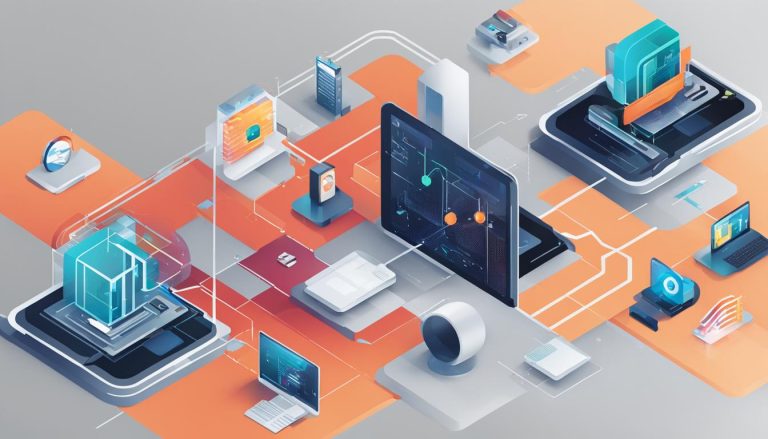In today’s technologically advanced world, sensors have become an integral part of our everyday lives. But what exactly is a sensor? In simple terms, a sensor is a device that detects and measures physical or chemical properties in its environment. It plays a crucial role in various industries and applications, enabling the collection of real-time data that can be used for monitoring, control, and decision-making purposes.
When it comes to sensor technology, there are various types of sensors available. From temperature sensors that measure changes in temperature to pressure sensors that detect changes in pressure, each sensor type serves a specific purpose. Motion sensors, proximity sensors, and many others also play their part in ensuring efficiency, safety, and accuracy in different industries.
The importance of sensors lies in their ability to provide valuable data for a wide range of applications. Whether it’s in the automotive industry, healthcare, manufacturing, or environmental monitoring, sensors contribute to making our world more connected and efficient. They have revolutionized the way we live and interact with the world around us, making our lives easier and safer.
So, let’s delve into the fascinating world of sensors and explore their functionality, types, applications, and the impact they have on our everyday lives.
Key Takeaways:
- A sensor is a device that detects and measures physical or chemical properties in its environment.
- There are various types of sensors, including temperature sensors, pressure sensors, motion sensors, and proximity sensors.
- Sensors play a crucial role in industries such as automotive, healthcare, manufacturing, and environmental monitoring.
- They enable the collection of real-time data, which can be used for monitoring, control, and decision-making purposes.
- Sensors have revolutionized our everyday life, making it more connected, efficient, and safer.
The Functionality of Sensors: How Do They Work?
Sensors are essential devices that play a crucial role in various industries and applications. But have you ever wondered how these remarkable devices actually work? In this section, we will delve into the functionality of sensors and explore the working principles behind them.
Each type of sensor operates based on different principles, depending on its purpose and the physical or chemical property it is designed to measure. For example, temperature sensors, such as thermocouples or thermistors, detect changes in temperature by utilizing the principles of electrical resistance or voltage. Pressure sensors, on the other hand, rely on strain gauges or piezoelectric crystals to measure changes in pressure. Motion sensors utilize technologies like infrared or ultrasonic waves to detect movement, while proximity sensors use electromagnetic fields or infrared light to determine the presence or absence of an object.
The importance and benefits of sensors lie in their ability to provide valuable data for monitoring and control purposes. By accurately measuring and detecting physical or chemical properties, sensors enable real-time data collection, allowing for accurate analysis and decision-making. This data can be used to improve efficiency, safety, and accuracy in a wide range of industries. From automating industrial processes to enabling predictive maintenance in manufacturing, sensors have proven to be indispensable tools in enhancing productivity and performance.
Furthermore, sensors contribute to energy savings by optimizing resource utilization. They enable automation and control systems to make intelligent adjustments based on real-time data, leading to more efficient operations and reduced energy consumption. In addition, sensors support improved decision-making by providing accurate and timely information. This helps businesses and organizations make informed choices, optimize processes, and achieve better outcomes.
“Sensors enable real-time data collection, allowing for accurate analysis and decision-making.”
The Benefits of Sensor Technology
The advancements in sensor technology have brought about significant benefits to various industries and everyday life. Some of the key advantages include:
- Automation: Sensors enable automated systems to react and respond to changes in their environment, reducing the need for manual intervention and enhancing efficiency.
- Energy Savings: By optimizing resource usage and enabling smart control systems, sensors contribute to energy conservation and cost reduction.
- Predictive Maintenance: With the ability to monitor and detect changes in equipment or machinery, sensors enable predictive maintenance, preventing costly breakdowns and improving operational reliability.
- Improved Decision-Making: Accurate and real-time data provided by sensors empowers businesses and organizations to make informed decisions, optimize processes, and achieve better outcomes.
In conclusion, sensors are remarkable devices that work based on different principles to detect and measure physical or chemical properties. Their functionality and working principles enable real-time data collection, leading to improved efficiency, safety, and accuracy in various industries. The benefits of sensor technology are far-reaching, with applications ranging from automation and energy savings to predictive maintenance and improved decision-making.
Types of Sensors and Their Applications
Sensors come in various types, each designed for specific applications. Here are some commonly used sensors:
- Temperature sensors: These sensors measure changes in temperature and are widely used in HVAC systems, weather monitoring, and industrial processes.
- Pressure sensors: Used to measure changes in pressure, these sensors find applications in automotive, aerospace, and industrial equipment for monitoring fluid or gas pressure.
- Motion sensors: These sensors detect movement and are commonly used in security systems, automatic doors, and energy-saving lighting systems.
- Proximity sensors: These sensors detect the presence or absence of an object within a certain range and are utilized in automatic faucets, touchless switches, and robotics.
- Light sensors: Used to measure ambient light levels, these sensors are found in smartphones, digital cameras, and automatic street lighting systems.
- Humidity sensors: These sensors measure the level of moisture in the air and are commonly used in greenhouses, HVAC systems, and weather monitoring stations.
Each type of sensor has unique characteristics and features that make it suitable for specific applications. It’s important to choose the right sensor based on the requirements of the task at hand.
Applications of Sensors
Sensors find extensive applications across various industries and sectors. Some notable applications include:
- In the automotive industry, sensors are used for engine diagnostics, tire pressure monitoring, and advanced driver assistance systems.
- In healthcare, sensors are employed in medical devices for monitoring vital signs, drug delivery systems, and prosthetics.
- In environmental monitoring, sensors are used to measure air quality, water pollution levels, and weather conditions.
- In manufacturing, sensors play a crucial role in quality control, process automation, and predictive maintenance.
- In consumer electronics, sensors are used for touchscreens, gesture recognition, and virtual reality applications.
These are just a few examples of how sensors are utilized in various industries. With advancements in sensor technology, the applications are expanding, leading to improved efficiency, safety, and productivity in different fields.
| Type of Sensor | Applications |
|---|---|
| Temperature sensors | HVAC systems, weather monitoring, industrial processes |
| Pressure sensors | Automotive, aerospace, industrial equipment |
| Motion sensors | Security systems, automatic doors, energy-saving lighting systems |
| Proximity sensors | Automatic faucets, touchless switches, robotics |
| Light sensors | Smartphones, digital cameras, automatic street lighting systems |
| Humidity sensors | Greenhouses, HVAC systems, weather monitoring stations |
The Impact of Sensors on Everyday Life
Sensors have become an integral part of our everyday lives, revolutionizing various aspects and making a significant impact. Let’s explore some ways in which sensors have enhanced our daily experiences:
1. Smart Homes:
Sensor technology has transformed our homes into smart and automated spaces. Sensors installed in smart home devices enable us to control various aspects, such as lighting, temperature, security, and appliances, with just a few taps on our smartphones or voice commands. For example, motion sensors detect movement and trigger lights to turn on automatically when someone enters a room, making our lives more convenient and energy-efficient.
2. Healthcare:
Sensors play a vital role in the healthcare industry, assisting in monitoring and improving patient care. For instance, wearable sensors can monitor heart rate, blood pressure, and oxygen levels, providing real-time data to healthcare professionals. These sensors help in early detection of medical conditions, allowing for timely interventions and personalized treatments. Additionally, sensors in medical devices like insulin pumps and pacemakers ensure accurate delivery and continuous monitoring of vital signs.
3. Automotive Industry:
Sensors have revolutionized the automotive industry, enhancing safety, comfort, and efficiency. Anti-lock braking systems (ABS) use wheel sensors to detect changes in wheel speed, preventing wheel lock-up during sudden braking. Parking sensors use ultrasonic technology to help drivers maneuver their vehicles safely and avoid collisions. Moreover, sensors in advanced driver-assistance systems (ADAS) enable features like lane departure warning, adaptive cruise control, and collision avoidance, making our journeys safer and more enjoyable.
These are just a few examples of how sensors have made a significant impact on our everyday lives. From smart homes to healthcare and transportation, sensor technology continues to evolve, bringing more convenience, safety, and efficiency to our daily experiences.
| Sensor Application | Impact |
|---|---|
| Environmental Monitoring | Enables real-time data collection for analyzing and mitigating environmental issues, such as air quality, pollution, and climate change. |
| Industrial Automation | Improves production efficiency, reduces downtime, and enhances workplace safety through precise monitoring and control of industrial processes. |
| Energy Management | Helps optimize energy consumption in buildings and industries by monitoring usage, identifying inefficiencies, and enabling automation for energy conservation. |
| Smart Agriculture | Facilitates precision farming by monitoring soil moisture, temperature, and nutrient levels, allowing farmers to optimize crop production and conserve resources. |
As sensor technology continues to advance, we can expect even more innovative applications and benefits in the future. Sensors have undoubtedly transformed the way we live and interact with the world around us, making our lives more efficient, safer, and connected.
Conclusion
In conclusion, sensor technology has become an indispensable part of our modern world. Sensors play a vital role in detecting and measuring physical or chemical properties in the environment. They collect data and convert it into signals for processing and analysis.
From temperature sensors to motion sensors, proximity sensors to pressure sensors, there is a wide range of sensor types available, each with its own unique applications. The advancements in sensor technology have led to an array of benefits, including automation, energy savings, predictive maintenance, and improved decision-making.
These sensors have made a significant impact on various industries and everyday life. In healthcare, sensors enable accurate monitoring and diagnosis. In automotive, sensors improve safety and fuel efficiency. In environmental monitoring, sensors help in tracking pollution levels. In smart homes, sensors provide convenience and security.
As sensor technology continues to evolve, we can expect even more innovative applications and benefits in the future. Sensors will continue to revolutionize the way we live and interact with the world around us, making our lives more efficient, safer, and connected than ever before.
FAQ
What is a sensor?
A sensor is a device that detects and measures physical or chemical properties in its environment.
How do sensors work?
Sensors collect data and convert it into a signal that can be processed and analyzed. Different types of sensors work based on different principles depending on their purpose.
What are some common types of sensors?
Some common types of sensors include temperature sensors, pressure sensors, motion sensors, and proximity sensors.
What are the applications of sensors?
Sensors are used in various industries and applications, such as automotive, healthcare, manufacturing, and environmental monitoring.
What are the benefits of sensors?
Sensors offer benefits such as automation, energy savings, predictive maintenance, and improved decision-making.
How have sensors impacted everyday life?
Sensors have revolutionized various aspects of our everyday life, from healthcare to automotive, environmental monitoring to smart homes.
Jana is a public relations specialist and writes about all kinds of software products that make our life easier.


